'Pope's election concerns the entire world, not just the Church,' Apostolic Nuncio to Ukraine
 Photo: Apostolic Nuncio to Ukraine Visvaldas Kulbokas (ugcc.ua)
Photo: Apostolic Nuncio to Ukraine Visvaldas Kulbokas (ugcc.ua)
How surprising the election of the new Pope Leo XIV was, expectations of him, the role of the Pope in the modern Catholic Church, and the attitude of the late Pope Francis to Ukraine and the Ukrainian Greek Catholic Church are discussed in the interview with the Apostolic Nuncio to Ukraine, Visvaldas Kulbokas.
Takeaways:
- Will the new Pope become a reformer, like his predecessor?
- How did the late Pope Francis plan to visit Ukraine during the full-scale war?
- Will the new Pope be more active in the peaceful resolution of the Russian-Ukrainian war?
As expected, the cardinals' conclave did not last long—white smoke from the chimney of the Sistine Chapel appeared on the second day. However, the election of the new Pope came as a big surprise - Robert Francis Prevost was not listed among the favorites in any forecasts before the conclave.
The new Pope is young by Church standards, so he will lead the Catholic Church for a long time. He has plenty of time and energy to implement his policies, both within the Church and in the Vatican's relations with the outside world.
For Ukrainians - and not only for the Roman Catholic and Greek Catholic communities - a key issue is how exactly the new Pope will build his attitude toward Ukraine and the Russian armed aggression.
There were quite a few grievances from Ukrainians toward the previous Pope Francis in this regard, particularly due to his ambiguous statements. "The Pope has no divisions, no brigades, no battalions. He only has words, only moral and spiritual authority. And when the Pope repeated: 'Dialogue, dialogue, dialogue,' even that word itself meant: 'I do not agree with your Russian ideology that chooses war as a tool. Choose dialogue if you need something,'" explains the Apostolic Nuncio (de facto, the Vatican's envoy) to Ukraine, Visvaldas Kulbokas, in the interview with RBC-Ukraine.
He adds that a huge effort lies ahead for Ukraine, particularly from the media, to shape the proper understanding of the situation in Ukraine under the new Pope.
— How unexpected was the choice of the new Pope? Does he have the potential to become a reformist Pope like John XXIII or Francis? Or on the contrary, should we expect changes in a more conservative direction?
— We thank God for the election of the new Pope, Leo XIV.
It’s difficult to comment on whether this was a choice the cardinals had already considered before the conclave or not. They are prohibited from sharing such information, so we don't know anything about the path that led them to elect Leo XIV specifically.
I don't know the new Pope well - I met him only once, and that was on a specific matter. So, honestly, I don't know whether we can expect changes from Leo XIV. In his first speech after being elected, he emphasized his gratitude to Pope Francis. My impression is that he intends to continue the service of his predecessor, Pope Francis.
— How does the process of "taking office" for the Pope proceed – is it more of a spiritual act or a ceremonial one?
— I would say it's ceremonial, because morally and spiritually, once the candidate agrees to the result of the conclave, he already becomes the Pope. From that moment, the entire Church begins to listen to his voice.
Then he chooses the day when he officially begins his service. I would say that’s more of a legal and ceremonial aspect. And of course, that happens a few days later, usually within the week.
— These days there’s a lot of discussion about global problems to which the Catholic Church must respond. In light of this, what initiatives should we expect from the new Pontiff?
— From what we’ve already seen in the discussions between cardinals before the conclave, they talked about global issues as well as matters directly concerning the Church and the churches. For example, during the last meeting, they discussed the possibility of a common date for celebrating Easter and the legacy of the Council of Nicaea - that is, a more ecumenical aspect. But it’s clear that today, for example, we are here in Ukraine, and for us, Russia's aggression against Ukraine is almost the number one issue. And not only for Ukraine - even for the whole world.
It’s not just that the cardinals and the world understand that today there is no longer clarity regarding international law and the rights of nations. There is enormous chaos. So the Pope, as head of the Catholic Church, also bears responsibility for the moral contribution the Church and religion make to society and the life of the entire world. That's one side of it - how the Church understands its moral role in the world.

Visvaldas Kulbokas (Photo: rkc.org.ua)
But on the other hand, as a human being, I also see that it’s not just a lack of moral authority as such. I would say we face enormous issues that oblige us to solve them together - starting with environmental questions. We might think the environment can wait 10 or 20 more years, but these are issues that affect all humanity.
Even more so, issues like artificial intelligence. When I listen to conferences of scientists involved in various AI projects, they say that artificial intelligence will require a shared global understanding. Because it will drastically change our lives.
So, there are many challenges. And in this sense, I would say that not only the Catholic Church needs moral authority, but all people do - Orthodox Churches, Protestant Churches, and other religions as well. And not just religions. We need politicians to be moral authorities too, because if they're not, it's just pragmatism. Then a new administration comes and changes everything drastically. Because there’s no longer a clear understanding of what is good for humanity, or what truly matters to humanity. When everyone chooses only their own selfish or ideological projects, we all suffer.
The Pope's election concerns the entire world, not just the Church. And that’s why even before the election, many cardinals were already saying that he would face a difficult role. I even heard proposals that the newly elected Pope should have a council of cardinals that works more closely with him. Because being the head of the Church alone today, in my opinion, is not easy.
At the theological level, yes, because theology doesn’t require major changes. But when it comes to responding to various social and global challenges, one person alone can no longer manage. That's why the newly elected Pope will likely strive to collaborate more with cardinal advisors.
— To what extent is the Church's position defined by the Pope, and what role do institutional inertia and continuity play?
— In the Catholic Church, how do we understand the role of the Pope? In matters of faith and the most important aspects of morality, the Pope is infallible. In that sense, only he can resolve various questions. And from that point on, the whole Church lives in the direction the Pope sets.
But today, the Church also discusses not only issues of faith and morality, because there are many social and political challenges. And in this sense, one could speak of a kind of democracy. Because each bishop, priest, and layperson may understand the same issues differently. But that is also a bit of a challenge for the Church - because when the Pope speaks on something, even if it’s not about faith or morality, it is difficult to take a completely different position.
In this sense, I would say there is a certain imperfection in understanding the role of the Pope because it's not always easy to distinguish where questions of faith and morality begin and end, and where other matters - where the Pope is not infallible - start. But the Pope's influence is immense.
— And how does the Pope generally choose his name?
— It's personal. Sometimes the Pope honors a saint or remembers a Pope who was an example for him. But it's completely free - every new Pope freely chooses his name.
— During Pope Francis's pontificate, there were many calls for him to visit Ukraine, but it never happened. Why, in your opinion? And what would be needed for the new Pope to come to Ukraine?
— When I spoke many times with the leaders of the Secretariat of State - Cardinal Parolin and his deputies - they always told me: "We can only suggest. It’s the Pope’s decision."
I remember that in 2022, there was even a moment - on May 15 - when the defenders of Mariupol had not yet been taken captive. There was a very complex proposal involving cooperation between different countries. It was perhaps a utopian idea to involve China, Turkiye, and Pope Francis as moral authority to help the defenders of Mariupol get out alive - not necessarily to return to non-occupied Ukrainian territory or avoid captivity, but to go to another country to stay there during the war.
When I informed the Vatican about the discussion of such a proposal, I immediately received a response from Pope Francis: if it happens, he will come to Ukraine, to Mariupol. That means spiritually, Pope Francis was ready to come to Ukraine. This example shows me that his decision depended on his sense of when he could be most useful.
For him, the issue wasn’t about showing he stands with Ukraine, but rather about when his presence would bring the greatest results. We can debate whether that was the right approach or not, but that was his thinking.
I spoke several times with the Pope, and I even saw that his understanding evolved, because in 2022, I realized he was already preparing to come - I was expecting him. Then something changed in his thinking. And at the end of 2024–beginning of 2025, his position changed again. I again began expecting his visit to Ukraine. Only, there was no clarity about when.
So Pope Francis was someone who, even after making a decision, felt free to change it if he realized it was a mistaken decision or if new information came to him. For me, it was never easy to understand whether he would come or not, or when he might come.
— In Ukraine, there has been quite a bit of criticism toward Pope Francis, particularly due to some of his ambiguous statements. How do you perceive them and the criticism? And what views have you heard about this within the Vatican?
— I would even say that in 2022, more than 30% of all the calls and messages I received were reactions from bishops, priests, and people to the Pope's words or initiatives. There wasn’t even enough time to understand what was happening and to work.
There are many aspects here because even when I communicate with bishops and priests who serve in Kharkiv, Zaporizhzhia, Odesa, and Kyiv, and compare this with how we communicate with bishops who permanently live in the western regions of Ukraine, there is already a huge difference - in priorities, in emotions.
When we go abroad from Ukraine, the difference becomes even greater. And in this sense, when I go to the Vatican and meet with my colleagues or with our leaders in the Secretariat of State, it is always very difficult for me. Because of this time of war - it’s as if we live in two different worldviews, in different worlds. Over there, there are many issues, while here, as a Church, we have only two or three - faith, prayer, and war. And humanitarian concerns.
In this sense, when Pope Francis would take the initiative or speak out, we always had to understand that in his mind, it was not only about Ukraine but also about Russia. And sometimes, I believe, he was speaking more to Russia. Even when he called for reconciliation or dialogue, or for a white flag.
From Ukraine, we might think those words were addressed to Ukrainians, and it might appear one way. But if we think that those words were more addressed to Russians, they take on a completely different meaning.
And this is a form of dialogue. Because the Pope has no divisions, no brigades, no battalions. He only has words, only moral and spiritual authority. And when the Pope repeated: "Dialogue, dialogue, dialogue," even that word itself meant: “I do not agree with your Russian ideology that chooses war as a tool. Choose dialogue if you need something.” That is one aspect.
The second aspect is that we also cannot expect to have the same understanding - between us here and the bishops, and even the Pope, who are in Rome. Our experience is already vastly different. So, I would say, there’s no longer a possibility for our statements to fully align.
We live here, in a different space, and in the Vatican, there are Italian journalists at work, who are influenced not only by what they see in Ukraine. They are also influenced by information coming from Russia. In this sense, it's even more difficult for the Pope to clearly understand what words, and what initiatives can be the most helpful. Because we are all limited, we are all human.
Another aspect is that during wartime, we encounter a lot of misunderstanding not only from Russians but also from other countries. And then we ourselves become very vulnerable. It's like some kind of allergy. And when a word is not very clear, not very precise, we already perceive it negatively. That is, we become much more critical of everything that relates to Ukraine and the war.
— In your opinion, how will the new Pope's attitude toward Ukraine be shaped? Can we expect him to play a more active role in peace matters? Considering all the institutional points you mentioned?
— Regarding both the war and Ukraine, I would say that this is a huge task. Because even the Secretary of State of the Holy See or his assistants, when they speak with the Pope - I have this experience from when I worked in the Secretariat of State - they never have a lot of time to discuss all the issues because there are so many of them.
So here, I would say, it's the work of all of us. My work as a Nuncio, the work of the leaders of the Secretariat of State. It's the work of journalists - both those in the Vatican and Ukrainian journalists. What we say about the war, what we write. It is also not only the responsibility of the Ukrainian embassy, because the ambassador also has limited opportunities to meet with the Pope, but also of the delegations that go to the Holy See.
Every time I see that there is an official delegation from Ukraine going to meet with the Holy See - especially with Pope Francis -I rejoice because I know how important that is. I would say we all have to work together in this direction.
 Visvaldas Kulbokas (Photo: rkc.org.ua)
Visvaldas Kulbokas (Photo: rkc.org.ua)
— The Vatican is actively involved in mediation efforts, particularly regarding the exchange of prisoners and the return of Ukrainian children. How would you assess the progress in this area?
— The intentions are good, but as I mentioned, the system itself is underdeveloped because this is a very complex issue. With Russia, it's not enough for a personal representative of the Pope, like Cardinal Zuppi (the Pope's special envoy regarding the return of Ukrainian prisoners and children deported by Moscow – ed.), to deliver lists, issues, and requests, and even meet, he visited Moscow twice. This is not enough. Because there is a huge amount of work to be done on how to speak about it. A whole team is needed.
Then, when it comes to prisoners, for example, we see that some countries have greater financial resources. It's easier to facilitate exchanges when there is a system, when a country provides financial and logistical assistance. The Holy See sounds very good, but even when it comes to financial resources, they are not always available.
The same applies to children. We see how Qatar operates – with planes, and evacuating children. They allow them to rest somewhere before they are transported from Russia to Qatar or directly to Ukraine.
In this sense, it's not enough to just have the intention and the people working on this; there needs to be a whole system – finances and teams. I would say that there are still not enough efforts to achieve more results.
— In Ukraine, besides the Roman Catholic Church, there is also the Ukrainian Greek Catholic Church. What role does it play for the Vatican? And what might change under the new Pope? After all, Pope Francis personally knew and was friends with the Head of the UGCC, Sviatoslav.
— Yes, Pope Francis had a great personal experience with the Ukrainian Greek Catholic Church. I hope that the cooperation of the new Pope with His Beatitude Sviatoslav and other bishops of the UGCC will become even closer.
I would say that this is a huge potential. Concerning Ukraine, this is very clear. Both the Greek Catholic and Roman Catholic bishops know their people and history and remember the times of persecution, the Holodomor. They are the ones who can not only explain but also convey the emotions surrounding issues related to Ukraine.
But this is a more global issue because the Ukrainian Greek Catholic Church has its own history, liturgy, and culture. Here in Ukraine, the Church means not just faith. It also represents the experience of communication with people, relationships between priests and the authorities, priests and laypeople. It's a very original experience. Therefore, I would say that it has enormous potential.
In this regard, I feel privileged to be able to serve in Ukraine, where I have experience in communicating with Greek Catholics and Ukrainian Roman Catholics. For me, combining these two aspects is a great blessing.
— You have been working in Ukraine since 2021 and have witnessed the full-scale Russian invasion. What does Ukraine mean to you now?
— Now, Ukraine for me has enormous potential, even in a moral sense. Because, I would say, I see a lot of mistakes. It’s not just a misunderstanding from partners, a misunderstanding from the international community. There are many mistakes here, in Ukraine as well. And it’s already a great miracle that we are all here.
Ukraine is not occupied; Ukraine is still free. But it's the people because they are the potential. People who have faith. Even those people, even those soldiers I see, who sometimes say they are not religious. But I see tremendous faith in them because they go and do. And this is faith in humanity.
These two aspects are faith in humanity and faith in God. If we combine them, it's a tremendous potential not only for Ukraine but for the whole world.
I consider it a great blessing for me to be in Ukraine during the war because it allows me not only to be with people but to feel, to have an experience close to that of the people. It will never be the same experience. Because when I speak with other diplomats, we always say that for us diplomats, life is much easier because, even financially, we don’t face the same challenges that people who evacuated from the occupied territories face, for example.
But the experience of war is real. This experience is very important in a spiritual sense because when you go to sleep and never know if you'll be here in the morning or if you'll be alive – these are constant spiritual exercises for us. In this sense, it’s already a gift from God, despite the many, many destructions, killed children, soldiers, and civilians.
On the other hand, it's a blessing for me to see how people and volunteers, defend their country. Not only defend it but understand what needs to be done, even when they know they won’t get enough help from abroad or even from inside the country. And despite everything, they continue.
Here, there is a huge example: when you logically think that your efforts will not be enough, and you continue anyway. This is faith in humanity. This is the potential for all of humanity. Because we see that even in Europe, even in countries that consider themselves partners of Ukraine during the war, they are accustomed to a comfortable life. And they have already lost the potential that Ukraine has today.

